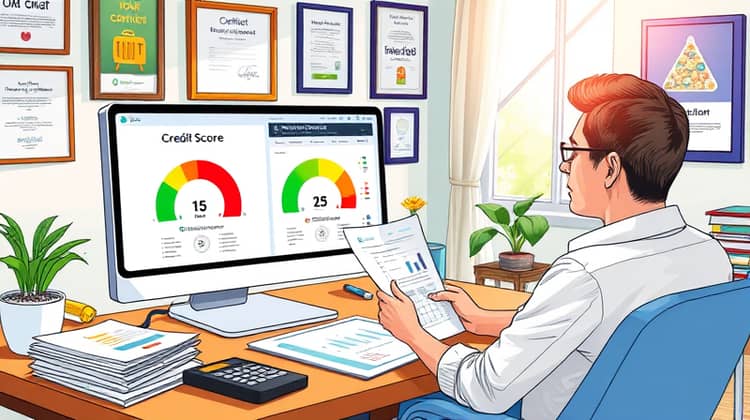Good Credit Habits: 6 Essential Steps to Build and Maintain Your Credit

In today’s financial world, having good credit is essential. It opens doors to better loan rates, housing opportunities, and even job prospects. Understanding how to build and maintain your credit can be the difference between financial success and hardship. By adopting good credit habits, you can ensure a healthy credit score that reflects your reliability as a borrower.
This article will outline six essential steps to help you build and maintain good credit. Each step is designed to provide you with practical tips and insights on credit management, ensuring that you not only improve your credit score but also understand the underlying factors that contribute to your creditworthiness.
Whether you are just starting your credit journey or looking to improve an existing score, these steps will guide you toward making informed financial decisions that positively impact your credit profile. Let’s dive in!
1. Understand Your Credit Score and Report

Credit scores and reports are complex but critical aspects of financial health. Understanding what makes up your credit score can give you significant insight into how lenders view you as a borrower. A credit score typically ranges from 300 to 850, with higher scores indicating lower risk for lenders.
Your credit report contains detailed information about your credit history, including the types of credit you have, your payment history, the amounts you owe, and more. Regularly reviewing your credit report is essential to identify any errors or fraudulent activities that could shorten your credit life.
Additionally, several factors impact your credit score, such as payment history, credit utilization, and length of credit history. By familiarizing yourself with these factors, you can strategically take steps to improve your credit standing.
2. Pay Your Bills On Time

One of the most important factors affecting your credit score is your payment history. Consistently paying your bills on time demonstrates reliability to lenders and significantly boosts your credit score. Even one missed payment can cause a severe hit to your credit score, so it's crucial to stay on top of your due dates.
To help manage payments, consider setting up automatic payments or reminders for bill due dates. Many financial institutions provide alerts that notify you when a payment is approaching or if your account balance is low. By being proactive, you can avoid late payments and maintain a strong credit history.
If you find yourself unable to make a payment on time, communicate with your lender. Many will work with you to set up a payment plan or provide a grace period, which will help minimize damage to your credit score.
3. Keep Your Credit Card Balances Low

One of the primary components of your credit score is your credit utilization ratio, which is the amount of credit you're using relative to your total available credit. Keeping your credit card balances low – ideally under 30% of your credit limits – can significantly benefit your score. This practice shows lenders that you are responsible with credit and not overly reliant on borrowing.
By maintaining low balances, you reduce the risk of accumulating debt and help preserve your credit score. If you're currently using a high percentage of your available credit, consider paying down your debts to help improve your situation.
4. Avoid Opening Too Many New Accounts

While it may be tempting to open several new credit accounts to increase your available credit quickly, this can backfire and negatively affect your credit score. Each time you apply for new credit, a hard inquiry is generated, which can lower your score temporarily. Moreover, too many accounts can make you seem like a riskier borrower.
Instead, focus on building credit slowly and consistently. Opening one credit account every few months can help you establish a positive credit history without overwhelming your credit profile.
- Limit new applications to one every six months
- Consider whether you genuinely need a new credit card
- If required, add authorized users to existing accounts
Building responsible credit is a gradual process that requires patience and careful planning. Keep your credit profile manageable and avoid rushing into multiple new accounts, as this could hinder your progress.
5. Use Different Types of Credit

Lenders like to see a mix of credit types on your credit report. Having different types of credit, such as credit cards, installment loans, and mortgages, can demonstrate your ability to manage various financial obligations responsibly. This diversity can positively influence your credit score.
However, it's important to only take on debt that you can manage. Adding a new type of credit should be a strategic decision that aligns with your overall financial goals.
- Consider a small personal loan to diversify credit
- Use a mix of secured and unsecured cards
- Balance credit card usage with installment payments
By carefully diversifying your credit types, you can show lenders your competence in managing different forms of credit, ultimately resulting in a better credit score.
6. Regularly Check Your Credit Report

Monitoring your credit report is vital in maintaining a good credit score. You are entitled to one free credit report each year from the three major credit bureaus. Regular checks allow you to stay informed about your credit status and catch any inaccuracies or fraudulent activities early on.
If you discover any discrepancies on your report, take immediate action to dispute them with the credit bureau. Correcting errors can improve your credit score and help you maintain a healthy credit profile.
- Obtain a free annual credit report
- Review it for errors or inaccuracies
- Dispute any incorrect information
By keeping a regular check on your credit report, you can ensure that you have accurate information that reflects your financial dealings, leading to a better understanding of your credit status.
Conclusion

Building and maintaining good credit is a crucial aspect of financial health that can greatly affect your life. By following the six essential steps outlined in this article, you can create a solid foundation for your credit profile. Understanding your credit score, making timely payments, and managing credit responsibly are all keys to success.
Additionally, staying informed by regularly checking your credit report and avoiding risky credit behavior can further bolster your credit profile. Taking these steps will not only improve your credit score but also empower you in your financial decisions.






